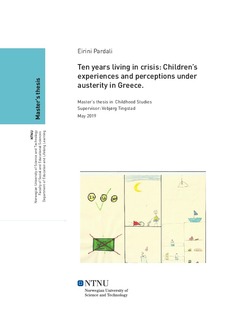| dc.description.abstract | Greece hit by the world financial crisis in 2009, has been in the centre of global attention for being one of the most affected countries mainly to its own fiscal deficiencies that lead the country to a chronical recession. Today, Greece ceased to have the spotlights on with its bailout formally ending on August 2018. Despite the formal ending of the crisis, the years of trauma left the country with a shrunk economy by one-quarter, the emigration of 300,000 people and the unemployment rate at 20%. Above all, the heavy weight of that socioeconomic political situation is mostly carried by families with children. In 2015, almost one in two children in Greece lived in a state of material deprivation, meaning that half a million children lived in poor families. Within this context, there have been several studies exploring the financial and political reasons why Greece reached this point of recession or the effects of crisis on children’s well-being. However, research in the specific context of Greece has been limited. This study aims to explore the economic and social pressures that crisis driven poverty brings to children’s everyday lives as well as the relational agency that children develop to fight back the consequences, by placing the children at the centre of the inquiry. This research was carried out in a small sized town in the Magnesia district (central Greece) of medium socioeconomic status. The participants of this study consisted of 17 children between the age of 11 and 12 years old, who were raised during crisis. The study involved adult participants as well; six parents and six teachers who experienced living conditions before and during the crisis. The study has been conducted with a qualitative, participatory research design. The methods used comprise semi-participant observation. drawings, ranking and spider diagram, individual interviews and focus group discussions. The study has drawn on social studies of children and childhood, which perceives childhood as a social structure and children as social actors. Structure is here represented by the highly restrained context of poverty and social exclusion driven by the financial crisis. Children’s agency is explored both as restricted by the socioeconomic factors and as extended in intergenerational interdependencies, leading to a rethinking of the concept of agency. The findings of this study reveal that children are great political commentators of the crisis’ implications on their lives and their ways in dealing with the consequences of crisis. Children living under austerity talked about three areas in their lives being affected by the crisis; financial and material aspects, fitting in with their peers and family setting. Children’s agency under the highly restrained context of austerity is revealed through their interdependent relations with parents, relatives and people in the community. The children’s agency is extended to the community, through school and church as its agents, which act collectively as nonformal social welfare to cover the needs of people in need, in the absence of the state’s responsibility. It is suggested that in order to improve the children’s living conditions under austerity, policies and intervention programs in Greece need to place the support of families with children as high priority and to integrate the society’s knowledge of ten years interdependency in state-funded social policies. | nb_NO |
